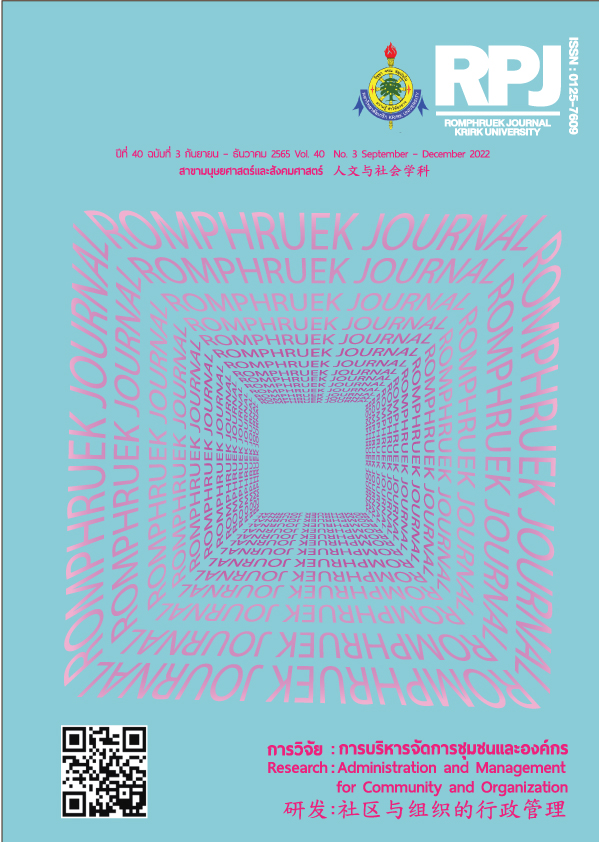Community Capability Development in Accounting for Housing Cooperative to support Baan Mankong project of Bangkok Metropolitan
Main Article Content
Abstract
The objectives of this research was to 1) investigate the problems and the constraints of the community book-keeping catering to Ban Mankong Project in Bangkok Metropolitan, and 2) the community capability development for book-keeping in comply with the housing cooperative format catering to Ban Mankong Project. Participatory Action Research (PAR) was the research methodology. The target group were the committees of the Savings Cooperatives or the Housing Cooperatives and the community accountants from four communities, four persons from each community for the total of sixteen persons. These four communities were: Soi Saphan Ruam Chai Community; the Southern Side of Na Sanambin Community; Tan Khu Community, and; Kao Na Community. The research tools were one on one in-depth interview form, SWOT Analysis, and focus group discussion. The data were received from the review of the literature, one on one in-depth interviews, focus group discussion, sharing opinions, training, field studies at the standardized Housing Cooperatives, book-keeping workshops, lesson-learned from doing trial book-keeping, and the outcome report meeting.
The results showed that first there were problems and constraints in terms of management, these were: the accountants, the community, budget, management and resources. In other words, the problems and the constraints could be summed up into four M of Management. The details were as follows: 1) Man – In this case, they were the accountants who lacked knowledge in book-keeping, and the majority of them were from the middle age group (the average age = 55 years old). In addition, the fact that they were all the committee members selected as volunteer to do book-keeping for the community cooperatives, however, they still had full-time jobs to support themselves and their families. Therefore, they lack enthusiasm and cooperation. 2) Money – The budget was insufficient 3) Management – the internal management of the cooperatives and the operational steps were unclear, disorganized, and not followed the cooperative rules and regulations, and 4) Materials – the cooperatives were lack of modern office equipment. Second, the guidelines of the community capability development for book-keeping in comply with the Housing Cooperative format catering to Ban Mankong Project were consisted of six steps of participatory capability development, these were as follows: providing knowledge and understanding in doing book-keeping in comply with the Housing Cooperative format catering to Ban Mankong Project; organizing four field studies to the standardized or well-organized housing cooperatives; practicing and training trial book-keeping in comply with the Housing Cooperative format; arranging four lesson-learned arenas with coaching to use in work place; conducting evaluation meeting and sharing results, and; making guidelines of doing book-keeping for housing cooperatives for self-study.
Article Details

This work is licensed under a Creative Commons Attribution-NonCommercial-NoDerivatives 4.0 International License.
Every article published in the Romphruek Journal of the Humanities and Social Sciences is the opinion and point of view of the authors. Thery're not the viewpoint of Krirk University or the editored department. Any part or all of the articles for pablication must be clearly cited.
References
กรมส่งเสริมสหกรณ์.(2563). คู่มือแนวทางในการแนะนำส่งเสริมสหกรณ์เคหสถานบ้านมั่นคง. (15 สิงหาคม 2563) สืบค้นจาก http://www.km.cpd.go.th/.
กลุ่มพัฒนาสหกรณ์บริการ กรมส่งเสริมสหกรณ์. (2561). กรอบแนวทางพัฒนาการบริหารจัดการสหกรณ์เคหสถานบ้านมั่นคงให้มีประสิทธิภาพ ปีงบประมาณ พ.ศ.2561. (15 สิงหาคม 2563)สืบค้นจากhttps://www.cad.go.th/main.php?filename=accounting_system.
กัลยา นาคลังกา และคณะ. (2562). การพัฒนารูปแบบการบริหารจัดการของสหกรณ์เคหสถานชุมชนริมคลองลาดพร้าว. วารสารวิชาการมหาวิทยาลัยราชภัฎพระนคร, 9(2),121-133.
กาญจนา แก้วเทพ และ สมสุข หินวิมาน. (2553). สายธารแห่งนักคิดทฤษฎีเศรษฐศาสตร์การเมืองกับสื่อการศึกษา. กรุงเทพฯ : ภาพพิมพ์.
จันทิกา สุภาพงษ์ และคณะ. (2561). การพัฒนารูปแบบการประเมินการบริหารจัดการของสหกรณ์เคหสถาน ชุมชนริมคลองลาดพร้าว. วารสารวิชาการสถาบันเทคโนโลยีแห่งสุวรรณภูมิ, 4(1), 80-93.
ชุติกาญจน์ เกิดประกอบ. (2554). ปัญหาการจัดทำบัญชีของสหกรณ์ในจังหวัดอ่างทอง. บัณฑิตศึกษา วิทยาลัยเทคโนโลยีราชมงคลธัญบุรี, ปทุมธานี.
ณัฐภัส ชินกิ่ง. (ม.ป.ป). การสอนแนะนำงาน. (30 มิถุนายน 2564) สืบค้นจากhttp://webintra.diw.go.th/hrmc/knowledge/COACHING.pdf.
พีรญา ตั้งสกุล. (2553). แนวทางการพัฒนาศักยภาพในการปฏิบัติงานของบุคลากร องค์การบริการส่วนตำบลพระครู อำเภอเมืองบุรีรัมย์ จังหวัดบุรีรัมย์. คณะรัฐประศาสนศาสตรมหาบัณฑิต มหาวิทยาลัยขอนแก่น, ขอนแก่น.
วิชิต เอียงอ่อน และคณะ. (2563). แนวทางพัฒนาความรู้ด้านการจัดทำบัญชีของสหกรณ์โครงการบ้านมั่นคง จังหวัดจันทบุรี. วารสารวิชาการวิทยาลัยสันตพล, 6(1), 48-57.
วิรัช วิรัชนิภาวรรณ. (2552). แนวคิดและความหมายของการบริหารและการบริหารจัดการ. (25 ตุลาคม 2563) สืบค้นจากhttp://www.wiruch.com/articles%20for%20article/article%20concept% 20and%20meaning%20of%20admin%20and%20mgt%20admin.htm.
วันมีชัย บูรณะพันธุ์. (2550). การศึกษาปัจจัยพื้นฐานสู่ความสําเร็จในด้านการมุ่งเน้นทรัพยากรบุคคลจากองค์การระดับโลกที่ได้บรางวัลคุณภาพแห่งชาติ. บัณฑิตวิทยาลัย มหาวิทยาลัยธรรมศาสตร์.กรุงเทพฯ.
สถาบันพัฒนาองค์กรชุมชน (องค์การมหาชน). (2558). โครงการบ้านมั่นคง การพัฒนาที่อยู่อาศัยโดยองค์กรชุมชนและท้องถิ่น : สำนักงานบ้านมั่นคง สถาบันพัฒนาองค์กรชุมชน (องค์กรมหาชน).(5 สิงหาคม 2563) สืบค้นจาก https://web.codi.or.th/development_project/20190321-135/.
สิริวิลาส มณฑลโสภณ. (2537). การวิเคราะห์ต้นทุน / ผลตอบแทนโครงการพัฒนาทรัพยากรบุคคล : กรณีศึกษาบริษัทการบินไทย จํากัด. หลักสูตรเศรษฐศาสตรมหาบัณฑิต มหาวิทยาลัยรามคําแหง, กรุงเทพฯ .
สุมิตรา ณ สุวรรณ. (2559). การส่งเสริมความเข้มแข็งให้แก่สหกรณ์ (สหกรณ์เคหสถาน)ภายใต้สภาวะเศรษฐกิจในปัจจุบัน. (20 กรกฏาคม 2564) สืบค้นจาก https://www.cad.go.th/ewt_news.php?nid=4592&filename=01.
อภิสรา ชุ่มจิตร และคณะ. (2557). การพัฒนาศักยภาพการจัดการธุรกิจชุมชน กรณีศึกษา : ตำบลคลองเคียน อำเภอตะกั่วทุ่ง จังหวัดพังงา. วารสารวิชาการมหาวิทยาลัยราชภัฏภูเก็ต, 10(2), 94-115.
Bourdieu, P. (1986). The Forms of Capital. (22 มิถุนายน 2564) สืบค้นจาก https://www.marxists.org/reference/subject /philosophy/works/fr/bourdieu-forms-capital.htm.
David C. McClelland. (1973). Harvard University “Competency” Testing for Competence rather than for Intelligence. New Jersey: American Psychologist.


